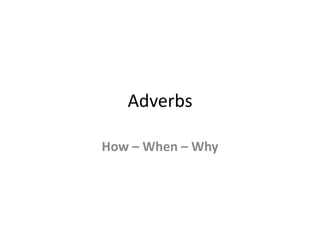
Nhwe gr u6adverbs
- 1. Adverbs How – When – Why
- 2. Adverbs describe a verb, adjective or another adverb • Adverbs tell how and when in the sentence • Adverbs answer the following questions in a sentence: how? How often? When? Where? Why? and under what condition something happens or happened. • There are 5 different group of adverbs. • Adverbs of Manner: She walked slowly and spoke quietly. • Adverbs of Place: She lives there. • She lived in that house. • She lived on the island all her life. • Adverbs of frequency: She often goes by herself. • She takes her children to the park every day.
- 3. Adverb of time: She got back home at 8 o’clock. He finished his job before dinner. She drank her tea first. Adverbs of Purpose: She drives her car carefully to get home early. She shops in different stores to get the cheapest goods. Position of Adverbs: Adverbs move around in a sentence. Adverbs of manner can be in different places in a sentence. Carefully he opened the door He carefully opened the door He opened the door carefully. Unfortunately, he didn’t win the game. He, unfortunately, did win the game. He didn’t win the game ,unfortunately. Before the main verb: I never get up before nine o’clock. He finally came to the class. Between the auxiliary verb and the main verb: He is often very calm . I have recently retired. Before the verb used to : I always used to see him at his summer house.
- 4. Adverbs are words that change the meaning of a verb: He drew slowly. How did he drive? They got on the boat quickly. How did they get on the boat? She spoke calmly . How did she speak ? The flowers are beautifully arranged around the park. The student showed a really wonderful attitude. Adverbs change the meaning of an adjective: He drove a very fast car. How fast was his car? He is quite a handsome guy. How handsome is he? She walked quite slowly down the road. How slowly did she walk? Not all words that end in –ly are adverbs The words lovely, lonely, motherly, friendly, etc. That lovely woman lives in a friendly neighborhood. Adverbs of manner tell us how something happens. They are usually placed after the main verb or after the object. If there is a helping verb (to be, have-has, can, must ) after the helping verbs. They give more information about the verb and tell in what manner the action is done. Quickly Beautifully, happily, etc Fast Loudly Angrily Slowly
- 5. He swims fast. She sings the song beautifully (after the object) The girl sings loudly to the crowd. He wrote his name clearly on his test paper. The dog quickly ate all the cake After the game , coach was too angry to talk. (too is an adverb it describes the adjective angry – how angry was the coach Jamie never told a lie (never describes the verb told: when did Jamie lie? Never. Exercise: Decide which one is an adverb or an adjective: He game me a friendly wave when I looked at him strangely . Friendly:_____________ (adj) Strangely:_________________ (adv) Fortunately, we found our seat quickly before the performance. Fortunately: _______________ (adv) Quickly: _______________ (adv)
- 6. Put the correct word in the blanks: 1. The performer danced ______________ across the stage (slow, slowly) 2. Jim is a _____________ good goalie on the football team. (real, really) 3. Ellen took notes __________ .(careful, carefully) 4. Fresh broccoli tastes ___________ raw. (good, well) 5. Did you sleep ___________ during the thunderstorm ? (good, well) 6. Are you feeling ____________? (good, well) 7. After the first 45 minutes through the match Emre began to play____________. (bad, badly) 8. ________________ the soldier fought the last dragon. (courageous, courageously) 9. Pamela ______________ placed all the pictures in the family album. (carefully, careful) 10. We walk to the bus __________, but we ___________ take the bus to come back. (regularly, regular - usual, usually)
